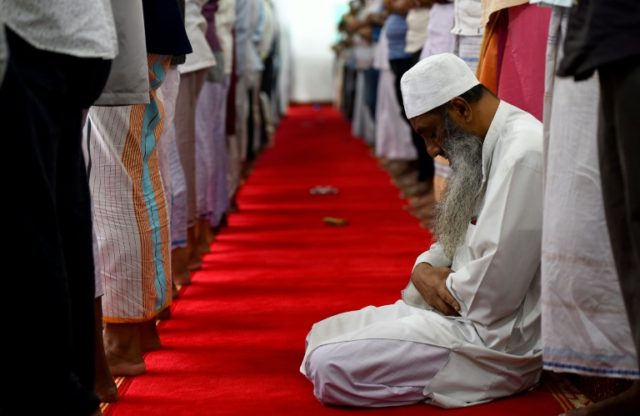Every Muslim minister and deputy minister in Sri Lanka’s government resigned on Monday following the resignation of two governors in response to a Buddhist monk’s hunger strike calling for Muslim officials to step down.
The monk, Athuraliye Rathana Thero, ended his strike after three days on Monday following the resignations of Western Province Governor Azath Salley and Eastern Province Governor M. L. A. M. Hizbullah. The mass resignation of Muslim ministers followed that event. All deny any affiliation to jihadist groups, as Buddhist lawmakers have alleged.
The Muslim ministers argued that the government was not doing enough to protect Muslims from popular outrage following the killing of over 250 people, including many children, in the six suicide bombings against churches and hotels on Easter this April. The Islamic State took credit for the attack in tandem with a local Muslim group, National Thowheed Jamath (NTJ).
Following the attacks, police found evidence of 11 mosques near the one used by NTJ members were teaching Wahhabism specifically or some form of fundamentalist Islam generally.
Opponents of President Maithripala Sirisena have found ample evidence, including an intelligence report from Indian sources, that Sirisena’s intelligence officials had reason to know that the attack was coming but failed to take warnings of an impending jihadist assault seriously. Popular outrage following the attacks has triggered mob violence targeting the homes of Muslims as well as Muslim-owned businesses and public centers.
The vast majority of Sri Lankans, about 70 percent, are Buddhists. Nearly ten percent are Muslims, while only 1.3 percent of Sri Lankans are Christians.
“What is happening today is innocent people are at the receiving end. They have become victims. It is true that some of the perpetrators of the April 21 incident were among our community. But we cooperated fully from the very first day to assist all law enforcement agencies and tri forces to establish sanity in the country and find the truth,” Rauff Hakeem, former minister of city planning, water supply, and higher education, said at the press event announcing the mass resignation, according to Sri Lanka’s Daily Mirror.
“We have been suffering heavier harassment. There are several who are languishing in remand prisons on minor issues. We expect the government to complete the inquiry thoroughly and fully,” Hakeem demanded.
Eight other ministers resigned alongside him. While they lose their ministerial portfolios, they do not lose their positions as party officials and thus do not weaken their parties in the legislature. Their presence will help Prime Minister Ranil Wickremesinghe against Sirisena’s majority.
“We will assist the government to survive but their survival will depend on their conduct on conducting investigations thoroughly and properly and do justice to everyone equally,” Hakeem asserted.
The resignations come on the fourth day of Athuraliye Rathana Thero’s hunger strike in the central city of Kandy. Thero also serves as a lawmaker and alleged that Sri Lankan authorities had information on a potential jihadist attack as early as three years ago, “but no action was taken out of fear of Muslim politicians,” according to Sri Lankan outlet Ada Derana. Thero also claimed that evidence tied multiple Muslim politicians directly to jihadist plots and said he would fast until death or until governors Salley and Hizbullah resigned.
His protest attracted hundreds, preventing public transportation from running and closing local businesses. Among those visiting him in support on Monday was the Archbishop of Colombo, Malcolm Cardinal Ranjith, who praised Thero for seeking justice for Christians.
Ranjith reportedly said that “Rathana Thero is appearing for the rights of the deceased and the injured from the Easter Day attacks and that the Thero is engaged in a protest fast after figuring out the real facts behind the attacks,” Ada Derana reported.
“We support the monk’s campaign because so far justice has not been served,” Ranjith told the Agence France-Presse (AFP).
At least one senior government official condemned the archbishop for his stance in defense of the victims of the Islamic State jihadist bombings. Finance Minister Mangala Samaraweera, himself a Buddhist, accused the clergyman of “fanning the flames of hatred” by visiting and supporting Thero.
Thero broke his fast shortly after Ranjith’s visit, as the two Muslim governors he accused of having jihadist ties had resigned.
Over 250 people died in the Easter attacks, which have dramatically affected Sri Lanka’s already chaotic politics. National police representatives reported Monday that they had arrested over 2,000 people while investigating the bombings, 1,655 of which have since made bail. Immigration officials have also expelled 200 Islamic clerics from the country for having expired visas or otherwise not meeting the legal requirements to be in the country and preach.
Since the attacks, Buddhist groups have staged mob attacks on several Muslim communities. Politicians have claimed that Sri Lankan security forces have participated in or allowed some of the riots to occur.

COMMENTS
Please let us know if you're having issues with commenting.